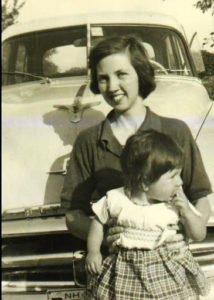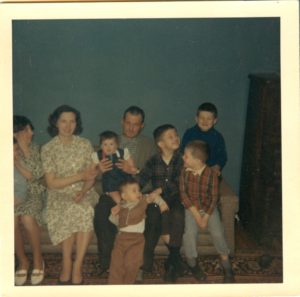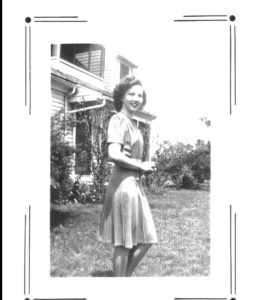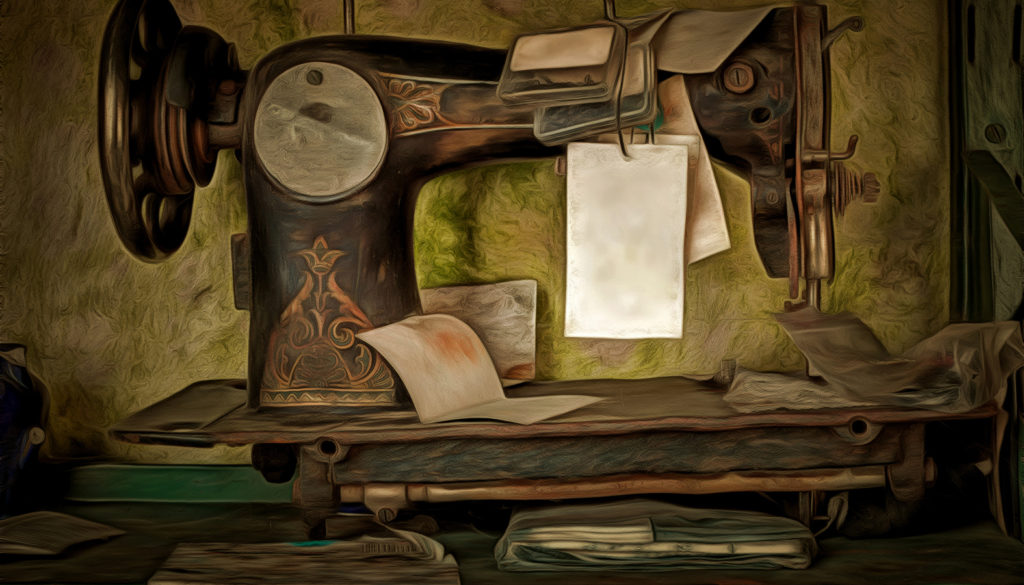For us solitary types whose lives — like Mary’s — consist largely in “pondering these things in our hearts,” there is seldom room at the inn.
The rest of the world, with its ceaseless activity, gear, heedless noise — all just as it should be — crowd us out, relegating us to some dingy corner where we huddle, fingers pressed to ears, desperately yearning for a moment of quiet where our discoveries and insights and love can give birth.
My own mother, I would guess, in a household of eight kids, was always looking in vain for an inn. I came across her once, sitting on the edge of her and my father’s bed, gazing out the window around twilight and crying. I must have been about 12. “Mummy! Are you all right?”
She didn’t answer, just gazed at me with silent thanks.
Like most families, ours had secrets. I’ll probably never know them all, and I’m not sure I’d want to.

An incident, related many years after the fact by a sibling, is telling. My mother was an accomplished seamstress. She made her own wedding dress, clothes for us kids, slipcovers, and drapes: even a trousseau for my childhood doll: a peignoir, a traveling costume, an evening gown.
As we kids came of age and started moving out of the house, a bedroom opened up and she was finally able to have her own sewing room. Passing by when I came home from college, I’d see her in there, her mouth full of pins, her cut-out pieces neatly stacked, everything ship-shape, trim, and tidy.
One day apparently my father walked by, saw her working, poked his head in and asked, “What’s this project, Janet?”
“I’m making drapes for Aunt Madeleine,” she replied.
Dad did a double-take, then snapped, “Aunt Madeleine died three months ago.”
“I know,” my mother replied. “But I promised her I’d do up a set of drapes.”
My father worked as a bricklayer and that my mother didn’t bring in any money over the few dollars she charged here and there for her sewing was always a bit of a sore spot: one of those secrets that didn’t get openly talked about in front of us kids (thank heaven) but behind closed doors possibly festered.
When upset, my father often took one of us aside and vented. I can just hear him: “Am I crazy? I’m busting my rear end out there in the cold laying brick and she’s up there making curtains for her dead aunt!”
My father was devoted to my mother and he wasn’t malicious. Also he was super funny. So if I was the one he was venting to, we’d usually agree that Mom was a little cracked and have a good laugh.

But all these years later, hearing the story of Aunt Madeleine’s curtains, I sympathize with my now late mother down to the ground.
She was no pie-in-the-sky dreamer, after all, neglecting her duties as wife and mother. The house was always clean, the floors swept, the dishes washed, the laundry hung.
My mother wasn’t Catholic: she was a faithful parishioner at the Congregational church (now the United Church of Christ), across the street. But in a way, she had a Catholic heart. You take certain vows; you hold yourself to a standard that in the eyes of the world seems ludicrous, even frightening, in its “impracticability.” And the vow costs.
The vow cost her in other ways. My mother taught me to love books, maybe her finest, most enduring gift. She wrote better letters than anyone I know: newsy, descriptive, forthright, to the point. She was highly intelligent. I think she would have liked to be a writer herself.
She once — just once — submitted a piece for publication, the way I remember it, to a religious magazine of some kind. The piece was accepted: I can only imagine her joy. She wouldn’t have allowed herself pride: but quiet joy, yes.
And then, I’m not sure they even gave a reason, the magazine decided they didn’t want the essay after all.
To my knowledge, she never submitted another piece. She continued to be faithful to her marriage vows, to her private vows to God, to her children, to her church, and to her conscience.

I picture her as long-suffering but dry-eyed, keeping her own counsel, along with God alone knows what other secret sorrows and silent suffering.
It’s a truism that daughters tend to live out the unfulfilled dreams of their mothers. I have no way of knowing if that’s true in my case. What I do know is that, though I take after my father in a hundred ways, my mother’s example has been the backbone of my life: Her fidelity to her watch. Her refusal to be moved. Her insistence on doing what she felt was right.
So on Mother’s Day, let me say that in case you did want to be a writer, Mom — I submitted another essay for you. And though I can’t sew a stitch, in my way I took up your thimble and scissors and measuring tape as well.
Fifty years later, searching for just the right word at my desk, I’m still working on Aunt Madeleine’s curtains.

